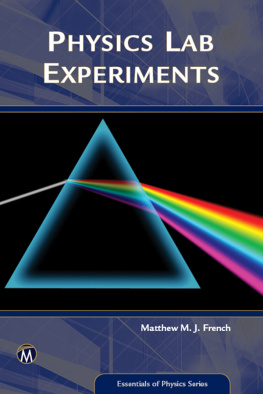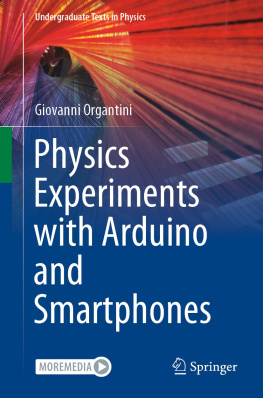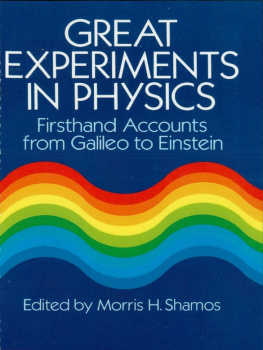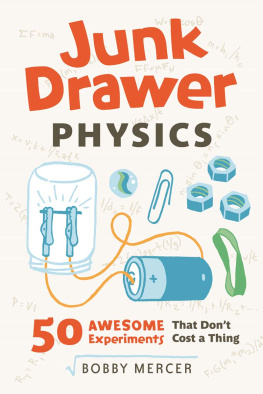Matthew M. J. French - Physics Lab Experiments
Here you can read online Matthew M. J. French - Physics Lab Experiments full text of the book (entire story) in english for free. Download pdf and epub, get meaning, cover and reviews about this ebook. year: 2016, publisher: Mercury Learning and Information, genre: Science. Description of the work, (preface) as well as reviews are available. Best literature library LitArk.com created for fans of good reading and offers a wide selection of genres:
Romance novel
Science fiction
Adventure
Detective
Science
History
Home and family
Prose
Art
Politics
Computer
Non-fiction
Religion
Business
Children
Humor
Choose a favorite category and find really read worthwhile books. Enjoy immersion in the world of imagination, feel the emotions of the characters or learn something new for yourself, make an fascinating discovery.
- Book:Physics Lab Experiments
- Author:
- Publisher:Mercury Learning and Information
- Genre:
- Year:2016
- Rating:3 / 5
- Favourites:Add to favourites
- Your mark:
- 60
- 1
- 2
- 3
- 4
- 5
Physics Lab Experiments: summary, description and annotation
We offer to read an annotation, description, summary or preface (depends on what the author of the book "Physics Lab Experiments" wrote himself). If you haven't found the necessary information about the book — write in the comments, we will try to find it.
Physics Lab Experiments — read online for free the complete book (whole text) full work
Below is the text of the book, divided by pages. System saving the place of the last page read, allows you to conveniently read the book "Physics Lab Experiments" online for free, without having to search again every time where you left off. Put a bookmark, and you can go to the page where you finished reading at any time.
Font size:
Interval:
Bookmark:
PHYSICS LAB
EXPERIMENTS
LICENSE, DISCLAIMER OF LIABILITY, AND LIMITED WARRANTY
By purchasing or using this book (the Work), you agree that this license grants permission to use the contents contained herein, but does not give you the right of ownership to any of the textual content in the book or ownership to any of the information or products contained in it. This license does not permit uploading of the Work onto the Internet or on a network (of any kind) without the written consent of the Publisher. Duplication or dissemination of any text, code, simulations, images, etc. contained herein is limited to and subject to licensing terms for the respective products, and permission must be obtained from the Publisher or the owner of the content, etc., in order to reproduce or network any portion of the textual material (in any media) that is contained in the Work.
MERCURY LEARNING AND INFORMATION (MLI or the Publisher) and anyone involved in the creation, writing, or production of the companion disc, accompanying algorithms, code, or computer programs (the software), and any accompanying Web site or software of the Work, cannot and do not warrant the performance or results that might be obtained by using the contents of the Work. The author, developers, and the Publisher have used their best efforts to insure the accuracy and functionality of the textual material and/or programs contained in this package; we, however, make no warranty of any kind, express or implied, regarding the performance of these contents or programs. The Work is sold as is without warranty (except for defective materials used in manufacturing the book or due to faulty workmanship).
The author, developers, and the publisher of any accompanying content, and anyone involved in the composition, production, and manufacturing of this work will not be liable for damages of any kind arising out of the use of (or the inability to use) the algorithms, source code, computer programs, or textual material contained in this publication. This includes, but is not limited to, loss of revenue or profit, or other incidental, physical, or consequential damages arising out of the use of this Work.
The sole remedy in the event of a claim of any kind is expressly limited to replacement of the book, and only at the discretion of the Publisher. The use of implied warranty and certain exclusions vary from state to state, and might not apply to the purchaser of this product.
PHYSICS LAB
EXPERIMENTS
Matthew M. J. French

Reprint and Revision Copyright 2017 by MERCURY LEARNING AND INFORMATION LLC. All rights reserved.
Original title and copyright: Finding Your Way in the Undergraduate Physics Laboratory. Copyright 2013 by M.M.J. French. ISBN 978-0-9549780-8-2. All rights reserved. Published by The Pantaneto Press.
This publication, portions of it, or any accompanying software may not be reproduced in any way, stored in a retrieval system of any type, or transmitted by any means, media, electronic display or mechanical display, including, but not limited to, photocopy, recording, Internet postings, or scanning, without prior permission in writing from the publisher.
Publisher: David Pallai
MERCURY LEARNING AND INFORMATION
22841 Quicksilver Drive
Dulles, VA 20166
www.merclearning.com
1-800-232-0223
M.M.J. French. Physics Lab Experiments.
ISBN: 978-1-942270-80-5
The publisher recognizes and respects all marks used by companies, manufacturers, and developers as a means to distinguish their products. All brand names and product names mentioned in this book are trademarks or service marks of their respective companies. Any omission or misuse (of any kind) of service marks or trademarks, etc. is not an attempt to infringe on the property of others.
Library of Congress Control Number: 2016935948
161718321 Printed in the United States of America
This book is printed on acid-free paper.
Our titles are available for adoption, license, or bulk purchase by institutions, corporations, etc. For additional information, please contact the Customer Service Dept. at 800-232-0223(toll free).
All of our titles are available in digital format at authorcloudware.com and other digital vendors. The sole obligation of MERCURY LEARNING AND INFORMATION to the purchaser is to replace the book, based on defective materials or faulty workmanship, but not based on the operation or functionality of the product.
CONTENTS
ABOUT THE AUTHOR
Dr. Matthew French studied for an undergraduate physics degree at the University of Bristol. While working there towards a PhD in experimental condensed matter physics, he spent four years demonstrating experiments in the first year undergraduate physics laboratory. Now an experienced school teacher and Head of Physics at Prior Park College, Bath (UK), he is well positioned to bridge the gap between students' knowledge at the end of secondary school and that expected of them at the beginning of their university courses.
LIST OF FIGURES
LIST OF TABLES
CHAPTER
INTRODUCTION
For some students, the experimentalists, their laboratory sessions are the highlight of their undergraduate degrees. It is in the laboratory that the physics they have learnt in lectures begins to make sense to them and the connections between the equations and reality are illuminated. Some of these students will continue working in laboratories to complete doctorates in experimental physics or turn to experimental work in industry. For other students, the theoreticians, the laboratory sessions are something that must be endured, often on a weekly basis. However, separating students into the discrete boxes of experimentalists and theoreticians does not really convey the holistic experience todays undergraduates receive: they must be talented at experiments as well as theory in order to excel at university.
This new book aims to guide both the experimentalist and theoretician through their compulsory laboratory course forming part of an undergraduate physics degree. Some students will have left school believing that physics experiments never work. Designing and performing good physics experiments is a craft, it is a skill developed gradually over time. I hope this book might go some way to persuading all students of the value and beauty within a carefully planned and executed experiment and help them develop the skills to carry out experiments themselves.
Those students who are completing undergraduate research projects and beginning a doctorate will also find helpful and relevant sections. Graduate students supervising laboratory sessions will find this a useful resource: especially the dedicated section on Demonstrating Undergraduate Physics Laboratory.
details a number of common experiments and example laboratory reports.
The idea of learning about experimental physics through reading a book, might at first seem to be tinged with a hint of irony. However, there are many concepts and techniques which a physics student needs to learn and understand. Often these are not specifically written down or taught in lectures: it is up to the interested student to investigate and learn for themselves. While the goal of this book is not to detract from this inquisitive and curiosity driven learning, it aims to provide an overview of the many topics and skills required in the first year undergraduate physics laboratory and beyond. Inevitably, some readers will find detail lacking in one area or another or pages which are currently superfluous to their needs. This book should not be read cover to cover, rather it should be dipped into to gain a basic understanding of a certain topic when necessary. Where needed the reader, then armed with a good grounding in the topic, can use other books or the Internet for further research.
Next pageFont size:
Interval:
Bookmark:
Similar books «Physics Lab Experiments»
Look at similar books to Physics Lab Experiments. We have selected literature similar in name and meaning in the hope of providing readers with more options to find new, interesting, not yet read works.
Discussion, reviews of the book Physics Lab Experiments and just readers' own opinions. Leave your comments, write what you think about the work, its meaning or the main characters. Specify what exactly you liked and what you didn't like, and why you think so.










